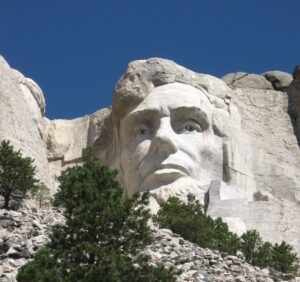This coming Monday is a holiday to honor the birthdays of all US Presidents. Although only Washington, Harrison, Lincoln and Reagan were actually born in February, the holiday that originated to celebrate our first president has expanded to include all forty-four. Washington’s actual birthday is February 22 but to create more extended weekends for federal employees, the official observation was moved to the third Monday of the month.
In previous columns, we have examined some of our country’s chief executives and have found most of them to be incredible men of faith. This week, I’d like us to consider the one whose likeness is impressed on every shiny penny, Abraham Lincoln. Although his birthday was actually this past Monday, his leadership is recognized as some of the best our nation has ever had at a time when it was needed the most. How did Lincoln assemble the necessary qualities to be the most influential nineteenth century American? 
To find the answer, we must begin with his roots. Abe Lincoln’s ancestors migrated to Rockingham County in the 1600s and brought with them a mix of Puritan and Quaker ancestry, both of which opposed slavery. Although Abe was clearly named after a Biblical character, so also were his sister Sarah, his father, Thomas, and his uncles, Mordecai and Josiah. His grandparents were Abraham and Bathsheba. It’s safe to say the Bible was a huge influence in the Lincoln family.
Although Lincoln’s father could not write, he was revered in his community and church for his honesty and he would later become a leader of the Primitive Baptists. Abe’s mother taught him to read and study the Bible and his cousin said that Abe was, “often and much moved by the stories.” Abe later said of his mother, “all that I am or ever hope to be, I owe to her.” It’s clear that Abe Lincoln’s parents were deeply devoted Christians who forged great character in their son.
After his mother’s early death, the nation’s eventual sixteenth president continued to read the Bible and would later say, “It is the best gift which God has ever given man. All the good from the Savior of the world is communicated to us through this Book. But for that Book we could not know right from wrong. All those things desirable to man are contained in it.”
In his own words, Lincoln saw himself as, “an instrument of Providence,” and in the Emancipation Proclamation invoked, “the gracious favor of Almighty God.” In establishing the first Thanksgiving, he openly referred to America’s blessings as gifts of God, not man. Proclaiming a National Fast Day in 1863, Lincoln said, “Those nations only are blessed whose God is the Lord,” and after Lee’s surrender, he spoke of the nation assembling, “together under one flag, worshipping a common God.” We would be wise to heed his warning that, “Those who fight the purpose of the Almighty will not succeed.”
Before his assassination, the last piece of legislation Lincoln signed made “In God We Trust” our national motto and ordered its inclusion on all currency, including the ones that now bear his own likeness. It is blatantly dishonest to claim that Lincoln was non-Christian especially since he quoted Jesus and took the two greatest commandments as his life’s guide.
Although atheistic biographers try to wipe all references to God from American history, after the death of Lincoln’s young son, the President not only attended Sunday worship faithfully, but also Wednesday prayer meetings as well, and no one considered him mentally ill for doing so as some have suggested about our current Vice President’s devotion to prayer. While God is the final judge, Lincoln’s pastor, Dr. Phineas Gurley, said, “the death of Willie Lincoln in 1862 and the visit to the Gettysburg battlefield in 1863 finally led Lincoln to personal faith in Christ.”
Where did Abe get his honesty? His integrity? His grit? His resolute opposition to slavery? His concern for a divided nation? While Lincoln is often considered a nominal believer, his own words and actions contradict these claims and make it clear what he believed and why. We often admire this man for the way he doggedly preserved the union, forgave his rivals, and persevered through great trial. But let us consider well what enabled him to do all of these. It was not inborn fortitude and insight, but the precepts and examples he learned from God’s Word. May we likewise seek those same resources from the same Source for the challenges we face today. Blessings, George